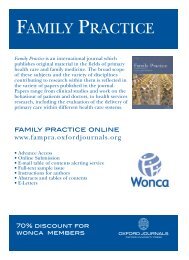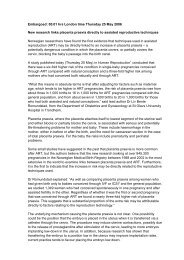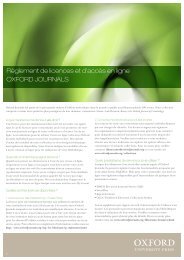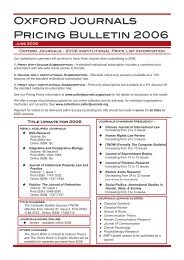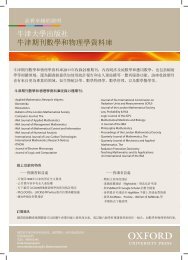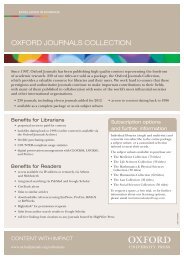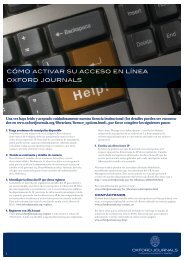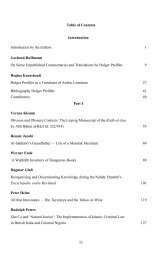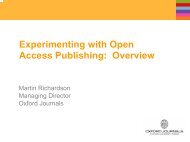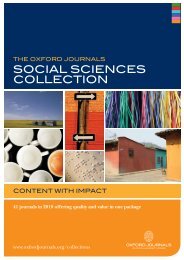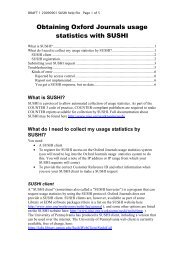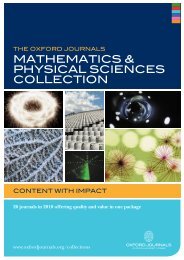Download the ESMO 2012 Abstract Book - Oxford Journals
Download the ESMO 2012 Abstract Book - Oxford Journals
Download the ESMO 2012 Abstract Book - Oxford Journals
You also want an ePaper? Increase the reach of your titles
YUMPU automatically turns print PDFs into web optimized ePapers that Google loves.
Annals of Oncology<br />
1231PD IMPACT OF CRIZOTINIB TREATMENT ON<br />
PATIENT-REPORTED SYMPTOMS AND QUALITY OF LIFE<br />
(QOL) IN ADVANCED ALK-POSITIVE NON-SMALL CELL<br />
LUNG CANCER (NSCLC)<br />
F.H. Blackhall 1 , T.L. Evans 2 , J. Han 3 , R. Salgia 4 , D. Moro-Sibilot 5 , S. Gettinger 6 ,<br />
L. Crino 7 , K. Wilner 8 , A. Reisman 9 ,S.Iyer 10<br />
1 Medical Oncology, The Christie NHS Foundation Trust, Manchester, UNITED<br />
KINGDOM, 2 Medical Oncology, University of Philadelphia, Philadelphia, PA,<br />
UNITED STATES OF AMERICA, 3 Center for Lung Cancer, National Cancer<br />
Center, Goyang, KOREA, 4 Department of Medicine, Section of Hematology/<br />
Oncology, University of Chicago, Chicago, IL, UNITED STATES OF AMERICA,<br />
5 Department of Lung Cancer, CHU De Grenoble - Hôpital A. Michalon,<br />
Grenoble, FRANCE, 6 Thoracic Oncology, Yale University School of Medicine,<br />
New Haven, CT, UNITED STATES OF AMERICA, 7 Medical Oncology, S. Maria<br />
della Misericordia Hospital, Perugia, ITALY, 8 Reseach and Development, Pfizer<br />
Oncology, La Jolla, CA, UNITED STATES OF AMERICA, 9 Medical Oncology,<br />
Pfizer Inc, New York, NY, UNITED STATES OF AMERICA, 10 Medical Oncology,<br />
Pfizer Oncology, New York, NY, UNITED STATES OF AMERICA<br />
Background: Crizotinib is a potent, selective, ATP-competitive ALK inhibitor<br />
demonstrating a high response rate in advanced ALK-positive NSCLC. The effect of<br />
crizotinib on patient-reported symptoms, functioning and QOL from PROFILE 1005<br />
is presented.<br />
Methods: PROFILE 1005 is an ongoing global, multicenter, open-label, single-arm,<br />
phase II study evaluating <strong>the</strong> safety and efficacy of crizotinib (250 mg BID in 3-week<br />
cycles) in previously treated patients with advanced ALK-positive NSCLC.<br />
Patient-reported outcomes (PROs) were assessed as secondary endpoints using <strong>the</strong><br />
European Organisation for Research and Treatment of Cancer questionnaire<br />
(EORTC-QLQ-C30) and lung cancer module (QLQ-LC13) at baseline, Day 1 of each<br />
cycle and at end of treatment. Functioning, symptoms and global QOL were assessed<br />
and scored on scales of 0–100. Higher scores indicate higher symptom severity or<br />
higher functioning/QOL. Change from baseline was assessed for statistical and<br />
clinical significance (defined as ≥10-point change from baseline).<br />
Results: As of Jan <strong>2012</strong>, 901 patients were evaluable for safety and 797 (88%) of<br />
<strong>the</strong>se patients had completed <strong>the</strong> entire questionnaire at baseline. The majority of<br />
patients was female (57%), never smokers (66%), and had adenocarcinoma (92%),<br />
with a median age of 52 years. A clinically meaningful (≥10-point) improvement<br />
from baseline was observed early and maintained in patient-reported symptoms of<br />
cough (Cycle 2 onwards), pain (Cycles 2 to 19), dyspnea from QLQ–C30 (Cycles 3<br />
to 19), pain in chest (Cycles 3 to 20 except for Cycle 18), pain in arm and shoulder<br />
(Cycles 3 to 16) and fatigue (Cycles 4 to 21). Clinically significant deterioration was<br />
observed for constipation (Cycles 2 and 3) and diarrhea (Cycle 2 to 6, 9 and 10).<br />
Clinically meaningful improvements were observed for physical functioning (Cycle 8<br />
and 9), role functioning (Cycles 9 and 10), social functioning (Cycles 4 to 15, except<br />
Cycle 12) and global QOL (Cycles 3 to 15, except Cycle 11).<br />
Conclusion: Treatment with crizotinib in pretreated patients with advanced<br />
ALK-positive NSCLC showed an overall positive impact on patient-reported lung<br />
cancer symptoms and global QOL.<br />
Disclosure: F.H. Blackhall: Advisory relationship with Pfizer. Honoraraia, research<br />
funding and o<strong>the</strong>r remuneration received from Pfizer. D. Moro-Sibilot: Honoraria<br />
received from Pfizer. K. Wilner: Employed by Pfizer as a Senior Director and has<br />
stock ownership with Pfizer. A. Reisman: Employed by Pfizer and has stock<br />
ownership with Pfizer. S. Iyer: Employed as a Director (Global Outcomes Research)<br />
by Pfizer. All o<strong>the</strong>r authors have declared no conflicts of interest.<br />
1232PD LUNG CANCER HARBORING HER2 MUTATION:<br />
EPIDEMIOLOGICAL CHARACTERISTICS AND<br />
THERAPEUTIC PERSPECTIVES<br />
J. Mazieres 1 , S. Peters 2 , A. Cortot 3 , B. Besse 4 , F. Barlesi 5 , M. Beau-Faller 6 ,<br />
T. Urban 7 , D. Moro-Sibilot 8 , J. Milia 1 , O. Gautschi 9<br />
1 Department of Pneumology, CHU Toulouse - Hôpital Larrey, Toulouse,<br />
FRANCE, 2 Oncology, Centre Hospitalier Universitaire Vaudois - CHUV,<br />
Lausanne, SWITZERLAND, 3 Pneumology, CHU Lille, Lille, FRANCE, 4 Thoracic<br />
Group, INSERM U981, Institut Gustave Roussy, Villejuif, FRANCE, 5 Service<br />
d’Oncologie Multidisciplinaire et Innovations Thérapeutique, Hôpital Nord,<br />
Marseille, FRANCE, 6 Hôpitaux Universitaires de Strasbourg et INSERM U682<br />
Hôpital De Hautepierre Laboratoire de Biochimie et de Biologie Moléculaire,<br />
Strasbourg Cedex, E/M Laboratoire de Biochimiee et de Biologie Moléculaire,<br />
Hôpitaux Universitaires de Strasbourg et INSERM U682 Hôpital de Hautepierre,<br />
Strasbourg, FRANCE, 7 Oncology Department, CHU Anger, Anger, FRANCE,<br />
8 Cancérologie, Hôpital A. Michallon - CHU Grenoble, Grenoble, FRANCE,<br />
9 Medizinsiche Onkologie, Luzerner Kantonsspital, Luzern, SWITZERLAND<br />
Introduction: HER2 oncogene is a member of <strong>the</strong> EGFR family, encoding a<br />
transmembrane receptor that drives and regulates cell proliferation. HER2 mutations<br />
are identified in about 2% of non small cell lung cancer (NSCLC), mainly located in<br />
exon 20, and appear to be critical for lung cancer carcinogenesis. Very scarce data<br />
are available to define a clinical profile of <strong>the</strong> patients harboring HER2 mutated<br />
NSCLC. We aimed to study clinicopathological characteristics and <strong>the</strong>rapeutic<br />
outcomes of patients harboring HER2 mutation in a large European series.<br />
Results: We retrospectively identified 46 NSCLC patients diagnosed with HER2 exon<br />
20 mutation. HER2 mutation was mainly exclusive as only one concomitant KRas<br />
mutation was described. Our population was characterized by a median age of 60 yr<br />
(31 to 86 yr), a high proportion of women (30 vs. 16 men, 65%), and of never<br />
smokers (24, 52%). All tumors were adenocarcinomas (two with lepidic features).<br />
Half of <strong>the</strong> patients had stage IV disease at <strong>the</strong> time of diagnosis. HER2 targeted<br />
treatment was delivered after conventional chemo<strong>the</strong>rapy. A total of 20 anti-Her2<br />
treatments were evaluable. We observed 4 progressive diseases, 7 disease stabilizations<br />
and 9 partial responses according to RECIST 1.1 (overall response rate ORR = 45%;<br />
disease control rate DCR = 80%). Specifically, we observed a DCR of 92% for<br />
trastuzumab-based <strong>the</strong>rapies (n = 14), 100 % for afatinib (n = 3) but no response to<br />
lapatinib (n = 2) and to a multiTKI (n = 1). Median survival was of 68.2 months and<br />
22.9 months for respectively early stage and stage IV patients.<br />
Conclusion: This study, <strong>the</strong> largest to date dedicated to HER2 mutated NSCLC,<br />
reinforces <strong>the</strong> importance of an HER2 screening strategy in lung adenocarcinomas.<br />
HER2-targeted drugs should be tested fur<strong>the</strong>r, ideally within large collaborative<br />
clinical trials.<br />
Disclosure: All authors have declared no conflicts of interest.<br />
1233PD EFFICACY AND PATIENT (PT)-REPORTED OUTCOMES<br />
(PROS) WITH SELUMETINIB (AZD6244, ARRY-142866;<br />
SEL) + DOCETAXEL (DOC) IN KRAS-MUTANT ADVANCED<br />
NON-SMALL CELL LUNG CANCER (NSCLC): A<br />
RANDOMIZED, PHASE II TRIAL<br />
P.A. Janne 1 , A.T. Shaw 2 , J.R. Pereira 3 , G. Jeannin 4 , J.F. Vansteenkiste 5 ,<br />
C. Barrios 6 , F.A. Franke 7 , L. Grinsted 8 , I. Smith 8 , L. Crino 9<br />
1 Lowe Center for Thoracic Oncology, Dana Farber Cancer Institute, Boston, MA,<br />
UNITED STATES OF AMERICA, 2 Hematology/Oncology, Massachusetts General<br />
Hospital, Boston, MA, UNITED STATES OF AMERICA, 3 Depto de Pneumologia,<br />
Grupo de Assistencia Médica, Sao Paulo, BRAZIL, 4 Service de Pneumologie,<br />
Hôpital Gabriel Montpied, Clermont- Ferrand, FRANCE, 5 Respiratory Oncology<br />
Unit (Pulmonology), University Hospital Gasthuisberg, Leuven, BELGIUM,<br />
6 Oncology, Hospital Sao Lucas da PUC de Porto Alegre, Porto Alegre, BRAZIL,<br />
7 Cacon, Hospital de Caridade de Ljui, Ljui, BRAZIL, 8 Oncology, Astra Zeneca,<br />
Alderley Park, UNITED KINGDOM, 9 Department of Oncology, Hospital Santa<br />
Maria della Misericordia, Perugia, ITALY<br />
Objectives: This randomized, double-blind, placebo (PBO)-controlled, phase II trial<br />
evaluated <strong>the</strong> efficacy and safety of SEL + DOC as second-line treatment for pts with<br />
KRAS-mutant advanced NSCLC. Assessment of <strong>the</strong> prevalence, severity, and change<br />
over time of lung cancer symptoms was an exploratory objective.<br />
Methods: Pts with stage IIIB-IV, second-line KRAS-mutant advanced NSCLC,<br />
received iv DOC 75mg/m 2 , and po SEL 75mg or PBO BD. PROs were assessed using<br />
<strong>the</strong> Lung Cancer-Specific Symptom Questionnaire (LSSQ), which includes <strong>the</strong> Lung<br />
Cancer Subscale (LCS) plus items relating to symptoms and functional activities<br />
from <strong>the</strong> FACT-L. Pts completed <strong>the</strong> questionnaire on Day 1, and every 3 weeks<br />
until discontinuation from study treatment, and at discontinuation.<br />
Results: 422 pts were screened across 67 centers in 12 countries; 87 were randomized<br />
(SEL + DOC, 44; PBO + DOC, 43). Baseline characteristics were reasonably balanced.<br />
OS was longer for SEL + DOC vs PBO + DOC (9.4 vs 5.2 mo), but not statistically<br />
significant (HR 0.80; 80% CI 0.56–1.14) and hazards were non-proportional. All<br />
secondary endpoints, including response rate (37% vs 0%; p < 0.0001) and PFS (5.3<br />
vs 2.1 mo; HR 0.58; 80% CI 0.42–0.79), were significantly improved for SEL + DOC<br />
vs PBO + DOC. Most frequent grade 3/4 AEs were neutropenia and febrile<br />
neutropenia. Compliance for completion of <strong>the</strong> LSSQ at baseline and at least 1<br />
follow-up visit was 85.5%. There was a numerical improvement in <strong>the</strong> change from<br />
baseline in <strong>the</strong> LSSQ scores with SEL + DOC compared with PBO + DOC,<br />
throughout <strong>the</strong> assessment period. In a post-hoc analysis, <strong>the</strong> % pts with a clinically<br />
meaningful improvement in LCS score was greater for SEL + DOC (44%) than PBO<br />
+ DOC (24%; OR 2.50; 80% CI 1.34–4.77; 1-sided p = 0.029). The time to<br />
deterioration of LCS score was also in favor of SEL + DOC (HR 0.33; 80% CI 0.22–<br />
0.49; 1-sided p = 0.0002).<br />
Conclusions: This is <strong>the</strong> first prospective study to demonstrate a clinical benefit of<br />
targeted <strong>the</strong>rapy (SEL + DOC) for pts with KRAS-mutant cancer of any type. In a<br />
post-hoc analysis, more pts experienced clinically meaningful improvements in lung<br />
cancer symptoms with SEL + DOC than PBO + DOC.<br />
Disclosure: P.A. Janne: I have served as a consultant to Astra Zeneca and have been<br />
compensated. A.T. Shaw: Research funding from Astra Zeneca and funding for costs<br />
of clinical trials. J.F. Vansteenkiste: Dr. Vansteenkiste is <strong>the</strong> holder of <strong>the</strong> Astra<br />
Zeneca Chair in personalized lung cancer care which provides research funding. L.<br />
Grinsted: Lynda Grinsted is an employee of Astra Zeneca and receives stock shares. I.<br />
Smith: Ian Smith is an employee of Astra Zeneca and receives stock. All o<strong>the</strong>r<br />
authors have declared no conflicts of interest.<br />
Volume 23 | Supplement 9 | September <strong>2012</strong> doi:10.1093/annonc/mds409 | ix403



